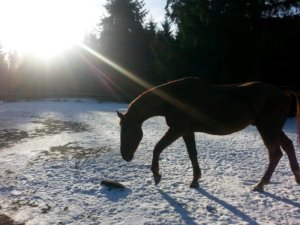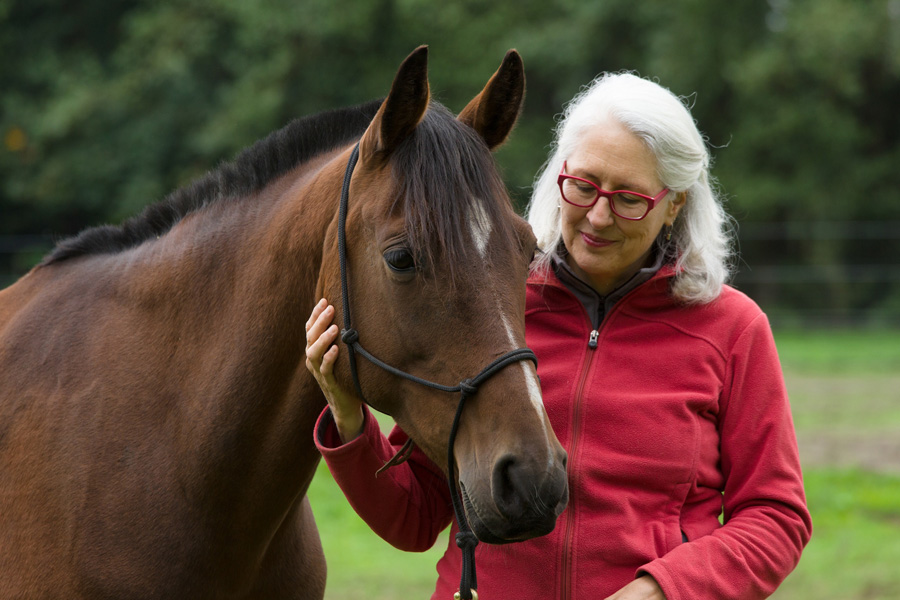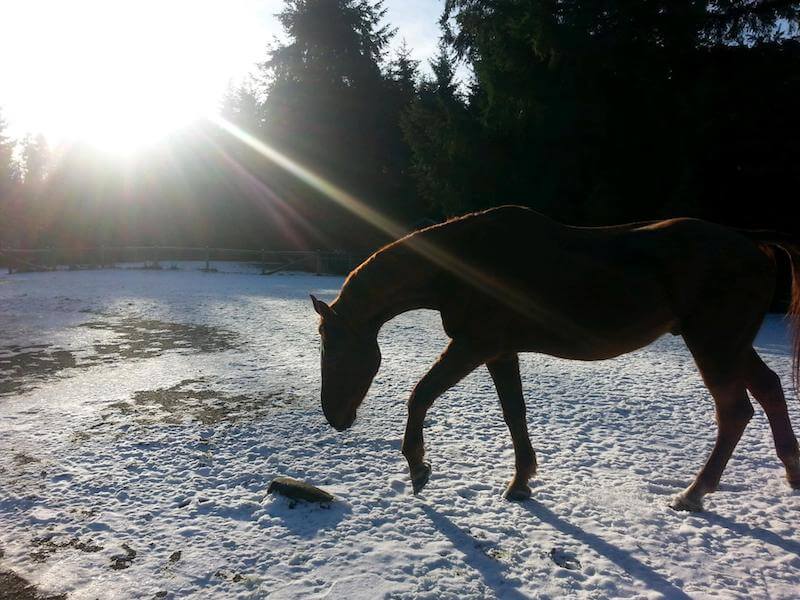Why Horses Think and Feel as They Do
by Barbara Breckenfeld, LAMP

If we spend much time around horses we soon realize that we can’t force a 1,000-pound animal to do anything. We also notice people who work with horse nature to motivate horses to do things because they want to—with minimal conflict. Besides positive traits such as being calm, determined, and not taking the horse’s behavior personally, these skillful people possess an understanding of how horses think and feel that informs how they work with them.
Over 55 million years ago, horses evolved living in groups and grazing on a wide variety of grasses, herbs, shrubs, and trees for 16 hours a day. Taking turns eating, resting, and staying alert to potential threats, equines find safety in a herd. Acutely sensitive to their environments, horses are quick to spot possible danger, and still equate survival with running away. Understandably, they prefer good visibility in order to see danger at a distance.
Horses became domesticated about 5,000 years ago—barely the blink of an eye compared to 55 million years–– and those millions of years still shape their bodies and minds.
As social-emotional mammals, horses and humans have lots in common. We live and work with others, we enjoy praise and reward for our efforts, we dislike shouting and being punished especially when we are afraid or don’t understand. Of course, horses, like humans, are all unique individuals. And like most mammals, we share the need for self-preservation, for food and water to survive, for procreation, for socializing and routines.
Horses don’t like to be afraid or in pain—though more averse to fear than pain (humans tend to the reverse). As masters of physical compensation, it makes sense. Survival in the wild meant not appearing weak or lame to predators. Horses dislike inconsistency, surprises, restraint or restriction of their ability to flee, isolation, and being chased—all things we must consider to effectively partner with them.
In contrast, we humans, descended from cave dwellers, sometimes forget that horses feel safer and more relaxed with clear escape routes, and that for a horse, being inside, alone, is unnatural. While many adapt, many find it a strain. We enjoy explaining horse behavior with a story from a human perspective. Plus, people have a sense of time, and agendas. We like results—now!
While our nervous systems have much in common, horses’ senses are hundreds of times more sensitive than ours, plus their brains function differently. The large human forebrain does abstract reasoning and gives us the ability to make associations from something specific to other similar things. Horses perceive specific sensory details, but don’t naturally generalize. For example, horses may not connect that what they see from one side is the same thing when they approach it from the other direction, while humans easily see it as one object from both sides.
Horses’ forebrains are wired differently. They live in the present, amidst the sea of sights, sounds, and scents around them, attending to their environment (including us) and the horses around them.
Though hardwired to run first and ask questions later, horses are naturally curious, and if given the time and space will investigate things that are new or unexpected in their environment. Whether they have a choice or are forced to explore something new, all animals have a built-in sense of caution. Supporting the inherent curiosity of these highly sensitive animals helps them learn.
Working With Horse Nature
Remember, we are similar and different. Put human safety first! Give your horse care that it thrives on: ample hay and lots of turnout with friends.
Remember that learning happens in relaxation. Think of ways to work with your horse’s nature. Horses learn from watching herd mates. Let them follow another horse over a jump or across a stream. Or go towards the barn where they already want to go. Allow ample time and space for curious exploration, repeated approaches, blows and snorts. Enjoy your horse’s curiosity and stay relaxed.
I do not believe horses are intentionally “naughty.” 99% of the time a misbehaving horse is trying to communicate something to humans who haven’t caught on. When we miss their first subtle cues, they may escalate until we notice. Or the horse shuts down. Horses who aren’t listened to may learn to start with behavior such as biting/kicking/rearing to get their message across.
Give your horse the benefit of the doubt. Observe your horse and study horse nature. Don’t take their behavior personally and enjoy being with your horse.

Barbara Breckenfeld of Movement in Balance does equine bodywork/massage and healing in the greater Puget Sound area, as well as offering her popular “Bodywork for Horses” clinics. She is nationally certified by NBCAAM, licensed as a Large Animal Massage Practitioner (LAMP) in Washington State, and an Equine Structural Integration Practitioner certified by the Equine Natural Movement School. Barbara became a horsewoman in 1993 when a handsome dapple-gray won her heart and introduced her to the fundamentals of dressage. Contact Barbara by email [email protected], call 425-260-0784, or visitwww.movementinbalance.com.






